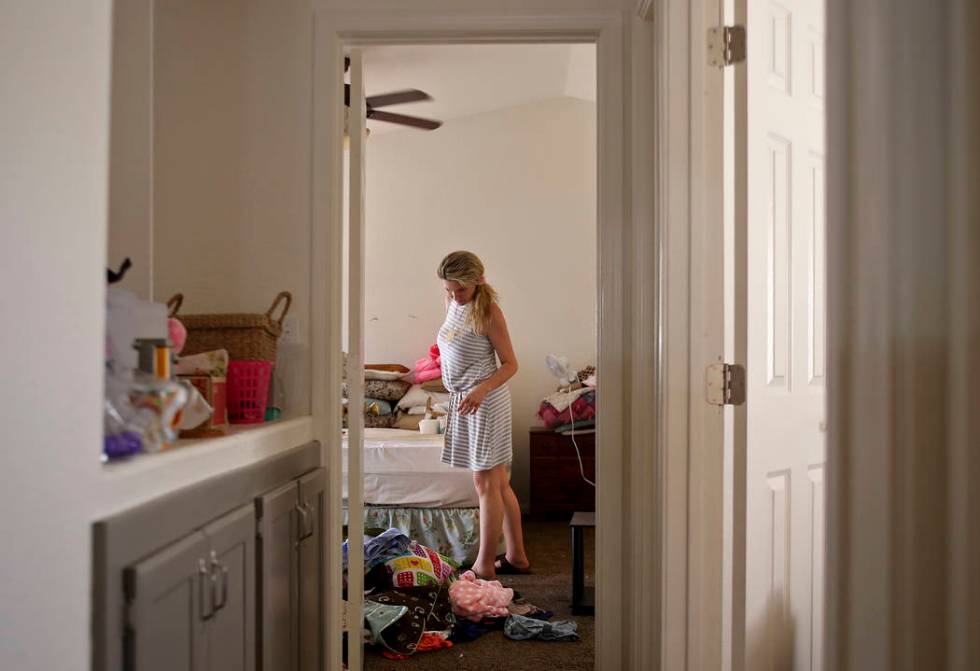First in an occasional series
Kari Monson never got her day in court.
Arriving home from a family vacation in July 2018, the Summerlin resident and her three children found an eviction notice taped to their door. It was Monson’s first sign, she claimed, that the rent money she left with the father of her two youngest children hadn’t been sent before he left on a trucking job.
The notice was posted July 6, the day Monson’s rent became overdue, court records show. It demanded that she either pay the $1,450 owed within the next four-and-a-half business days or move out. By the time Monson discovered the notice almost two weeks later, the family’s eviction was inevitable.
If she had lived in any other state, Monson would have also been served a copy of her landlord’s eviction lawsuit. She would have been automatically assigned a hearing or given time to request one after being sued so she could defend herself in court.
But in Nevada, tenants threatened with eviction for falling behind on their rent are required by law to initiate their own court case if they want a hearing. If a landlord is the first to file once an eviction notice for unpaid rent expires, the courts will grant the eviction by default.
“I would argue there are glaring due-process issues along with fair-housing issues with that process,” said Deborah Thrope, supervising attorney for the National Housing Law Project in San Francisco. “It shouldn’t be an issue of who can get to the courthouse quicker.”
From 2014 through 2018, Las Vegas Valley constable offices received eviction orders to carry out at more than 99,000 homes, apartments and hotel rooms, according to a joint analysis of government records by the Review-Journal and Brown University researcher Eric Seymour. In other words, roughly three in 10 renter households here faced a court-ordered eviction during the past five years.
Those tenants encountered one of the nation’s fastest eviction processes for nonpayment of rent, according to a Review-Journal survey of housing attorneys from every state. Even with reforms that take effect Monday, falling delinquent — the most common reason for eviction in the U.S., experts say — can put Nevadans on the street in as little as 15 days once their rent is overdue.
Homeless in two weeks
How quickly a tenant can be evicted for falling behind on rent varies widely throughout the U.S., according to a Review-Journal survey of housing attorneys in all 50 states.
The process begins in most states with a landlord notifying the tenant in writing that they will face an eviction lawsuit if they do not pay their rent. In every state, a court must approve the eviction before it can be carried out by local law enforcement officers.
The chart below represents the shortest amount of time each state's law allows a tenant to be forced from their home, if their landlord started the eviction process on a Monday. The process is often delayed by overburdened courts and law enforcement officers.
The process can leave financially insecure tenants scrambling to keep a roof over their heads while they scrape together enough money to rent another home. Having their credit report stained by an eviction creates an additional hurdle to finding permanent housing.
In Monson’s case, the court entered a default judgment the day after she got back from vacation. Deputies from the local constable’s office forced the family to leave their home on July 27.
Monson packed her children — Weston, 12; Dixie, 2; and Davie, 1 — and some clothes, toys and medication into her white SUV. Most of their belongings remained inside their former home, sealed behind a neon yellow sticker on the front door warning them to keep out or face arrest.
They spent the month following their eviction pinballing through six local hotels and timeshares while Monson searched for a new rental. Her youngest children’s father, who said he thought Monson had paid July’s rent, was still on the road for work.
“It’s been a domino effect of just horrible things,” Monson said. “I don’t really have a Plan B right now. I’m just floating.”
Changes in the law
After almost four decades of failed attempts at eviction reform, the Nevada Legislature enacted change in its latest two biennial sessions.
In 2017, lawmakers passed a bill allowing ousted tenants to seal their eviction records. Cases that tenants win or landlords abandon now are automatically sealed.
This year, lawmakers approved a measure giving tenants a full seven business days after receiving an eviction notice to pay their overdue rent, move or initiate a court case. Law enforcement officers must also give tenants at least 24 hours advance notice before evicting them, and landlords must allow evicted tenants to retrieve essential belongings for five days after they are locked out.
The bill’s champion, state Sen. Julia Ratti, said a provision requiring licensed third parties to distribute eviction notices should ensure that they are always delivered properly. Adding time before the notice expires should give tenants a better chance to gather rent money or find a new place to live before their landlord can file suit.
“I would have liked to see us extend it even longer,” said Ratti, D-Sparks. “But the legislative process is a negotiating process, and I think those couple of days will make a significant difference.”
Forced from their homes
Tenants who fall behind on rent will have at least five more days before they can be evicted under a new state law
taking effect July 1.
Once weekends are factored in, the changes will expand the minimum time needed to evict Nevada tenants from 10 to 15 days.
It will now take far longer to evict a tenant here than in Louisiana, where the law allows the eviction process to play out in less than a week. However, Nevada’s tenant protections still pale in comparison to some Northeastern states, where tenants who miss rent are guaranteed at least a month before being forced from their home.
But a slower eviction process doesn’t necessarily equate to a better process, landlord advocates say. Homeowners have a right to take back their property in a timely manner if a tenant stops paying them, said NMI owner Nancy Taylor, whose family business has prepared and served eviction notices in Las Vegas for more than 30 years.
“One of the things that people forget is that the landlord is paying for the house. It’s their business,” she said. “Just because they own property doesn’t mean they don’t need the rent money.”
Local landlord and real estate agent Noah Herrera said the vast majority of landlords here are “mom-and-pop” operations whose finances can be derailed by one or two missed rent checks.
“If the tenant stops making (rent) payments, the landlord still has to make their mortgage payment,” he said. “They could actually lose a home that they own.”
Herrera and Taylor both said Nevada’s new tenant protections may cause the opposite of their intended effect. The extended eviction process, along with a new a 5 percent cap on rent late fees, will likely result in landlords raising their rent and security deposit prices. Some landlords may start the eviction process sooner than they would have before, Taylor said.
“There’s no incentive for the tenant to pay quickly, so there’s no incentive for the landlord to work with them,” she said.
Burden on the tenant
Despite the recent reforms, Nevada remains the only state where a tenant must initiate an eviction case to guarantee a court hearing. Doing so requires tenants living in the state’s two most populous counties to pay a $71 filing fee unless they can get it waived.
In 34 states, the law requires courts to automatically schedule a hearing for tenants facing eviction. The remaining 15 states’ laws give tenants anywhere from three to 20 days to request a hearing after being served with their landlord’s eviction lawsuit.
Nevada Legal Services tenants attorney Ron Sung called the Silver State’s idiosyncratic process “the biggest problem with Nevada eviction law.” He likened it to requiring defendants to sue themselves.
“It really doesn’t make sense when you think of any other cases in the justice system,” he said. “That dynamic is completely flipped around. All the burden is placed on a tenant.”

Life after eviction
Eviction quickly took its toll on Monson’s family.
She and her three children were moving every few days and sharing a single room most nights.
Weston didn’t return to middle school for the fall semester. Monson said she stopped attending physical therapy for back and leg injuries from a car wreck in 2016. Locating an affordable place to stay the next night frequently took precedence over finding a new home.
“It is a very fine line between where I am right now and those tents set up on the other side of town,” Monson said while renting a timeshare near South Point casino three weeks after the eviction. “I can see now how easy it is for people to become homeless.”
Unemployed and living off government benefits and a settlement from the car wreck, Monson said life was more expensive after the eviction.
Each hotel had a hidden resort fee. Essentials that were locked inside her former home needed to be repurchased. When she rented a room without a refrigerator, she filled the sink with ice to make the family’s groceries last a few days.
It wasn’t long before she maxed out her credit cards. The eviction was beginning to feel like a hole she couldn’t climb out of.
“I’m so far out of money it’s sick,” she said. “I had some savings, but this ate me alive.”

Rising rents
Amid the foreclosure crisis a decade ago, homeowners who didn’t pay their mortgage remained in their homes for months or even years without paying a dime to banks. Now, tenants facing rising rents remain perilously close to losing their homes and possessions over a single late payment.
Increases in rent have outpaced renter household income growth over the past 16 years, according to the Nevada Housing Division. More than 220,000 low-income households in Nevada needed assistance obtaining affordable housing last year.
The average monthly rent in Las Vegas rose to more than $1,100 during the first quarter of 2019, about $200 more than its pre-recession peak, according to the CBRE commercial real estate firm.
It’s not uncommon for a tenant to fall behind on rent because of one medical bill, car repair or missed paycheck, said Lauren Pena, directing attorney for the Civil Law Self-Help Center inside the Regional Justice Center in Las Vegas.
“The customers that come in here who are facing eviction for nonpayment of rent are often making the decision to pay their rent or to actually spend that money on real-life, emergency survival issues,” she said.
However, financial hardship is not an adequate defense in eviction court. The tenants who do request a hearing typically get only a few minutes to prove that they’ve paid their rent or moved out or that their landlord refused to accept payment.
The ramifications of losing a case, either in court or by default judgment, can follow a tenant for years and across state lines on their credit report.
“If they have an eviction, no landlord will touch them,” said Las Vegas real estate agent Lee Goldberg. “They want to get the best possible person on paper, but they’re shutting out a lot of people and hurting a lot of families.”

An uncertain future
Monson had two hours to gather her family’s life.
On Aug. 20, 2018, exactly one month after the court granted her eviction, she was allowed back into her former rental home to retrieve what she could. Exhausted, Monson mostly watched as more than a dozen volunteers from a local church squeezed furniture and moving boxes into a U-Haul truck.
The garage held a mishmash of items she would never see again. Stacks of other belongings spilled onto the driveway, and the backyard became a dumping ground. The family’s mattresses were left in their former bedrooms.
Nearly everything going into the moving truck would be crammed into a nearby storage unit until Monson ran out of money to pay for it. The only possessions she had a firm grasp on were what she could fit into her SUV.
In two days, Monson and her children would leave their room at the Suncoast and head toward family in Utah. Nothing about the future seemed clear to her anymore.
Monson stood in the driveway as the truck reached its capacity. She felt her emotions swirl inside her: anger, heartbreak and humiliation all rolled together.
Who would rent to her when she was broke? What would she say when people asked why she had left her last rental?
“You get something on your record and spend the rest of your life trying to prove you’re not that person,” she said. “It’s even worse when someone uses your own downfall against you.”
Contact Michael Scott Davidson at sdavidson@reviewjournal.com or 702-477-3861. Follow @davidsonlvrj on Twitter.
How we reported this story
The Review-Journal sought to evaluate how eviction laws in Nevada compared with those of other states. Attorneys in all states with experience litigating eviction cases were interviewed to determine the most significant differences.
Focusing on the shortest amount of time state laws allow private landlords to evict a tenant who missed a rent payment was the priority. For comparison, the time calculated began the day rent became overdue and ended the day a tenant was locked out of the home.
Throughout the U.S., the eviction process is often delayed by the speed at which a landlord files. Backlogs in courts and law enforcement officers' schedules can stretch proceedings over many weeks.
To determine the number of evictions in the Las Vegas Valley, the Review-Journal obtained all eviction orders from 2007 through 2018 that constable offices received payment to carry out . The reports contained the names of tenants and landlords, tenants' addresses and the dates constable offices received payment.
To analyze the data, the newspaper partnered with Eric Seymour, a postdoctoral researcher at Brown University and an incoming assistant professor of urban planning at Rutgers. Seymour parsed more than 26,000 pages of records and created a map showing the general location of each eviction.
Tenant addresses that weren't single-family homes, multi-family homes or commercial living accommodations, such as hotels, were eliminated from the data set. When a single tenant had more than one eviction from the same address, only the most recent case was included.
The number of renter units for each census tract was retrieved from the U.S. Census Bureau's 2013-2017 American Community Survey five-year estimates, the most recent estimates available at the time of publication.
NOTE: This story has been updated to more accurately describe the constable offices' eviction records .













